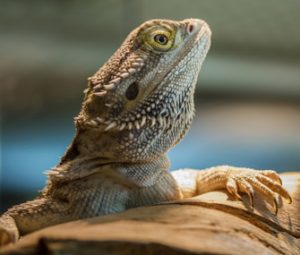Reptiles are one of the fastest growing sectors in the United States pet industry. Reptile-associated salmonellosis (RAS) continues to be an important public health problem, especially among children.
 We investigated an outbreak of human Salmonella infections resulting from serotypes Cotham and Kisarawe, predominately occurring among children. An outbreak of illnesses was identified in persons with exposure to pet bearded dragon lizards. Human and animal health officials, in cooperation with the pet industry, conducted epidemiologic, traceback and laboratory investigations. Onsite sampling was conducted at two US breeding facilities, one foreign breeding facility, and a large pet retail chain. A total of 166 patients in 36 states were identified with illness onset dates from 02/2012-06/2014. The median patient age was 3 years (range, <1-79 years), 57% were aged ≤5 years, and 37% were aged ≤1 year. Forty-four patients (37%) were hospitalized, predominantly children. Sampling at breeding facilities and a national pet store chain resulted in isolation of outbreak serotypes at each facility; isolation proportions ranged from 2%-24% of samples collected at each facility.
We investigated an outbreak of human Salmonella infections resulting from serotypes Cotham and Kisarawe, predominately occurring among children. An outbreak of illnesses was identified in persons with exposure to pet bearded dragon lizards. Human and animal health officials, in cooperation with the pet industry, conducted epidemiologic, traceback and laboratory investigations. Onsite sampling was conducted at two US breeding facilities, one foreign breeding facility, and a large pet retail chain. A total of 166 patients in 36 states were identified with illness onset dates from 02/2012-06/2014. The median patient age was 3 years (range, <1-79 years), 57% were aged ≤5 years, and 37% were aged ≤1 year. Forty-four patients (37%) were hospitalized, predominantly children. Sampling at breeding facilities and a national pet store chain resulted in isolation of outbreak serotypes at each facility; isolation proportions ranged from 2%-24% of samples collected at each facility.
Epidemiologic, microbiologic and traceback evidence linked an outbreak of uncommon Salmonella serotypes to contact with pet bearded dragons. The high proportion of infants involved in this outbreak highlights the need to educate owners about the risk of RAS in children and the potential for household contamination by pet reptiles or their habitats. Strategies should be developed to improve breeding practices, biosecurity and monitoring protocols to reduce Salmonella in the pet reptile trade.
Outbreak of human infections with uncommon salmonella serotypes linked to pet beareded dragons, 2012-2014, 18 April 2020
Zoonoses Public Health
Kiebler CA1, Bottichio L1, Simmons L1, Basler C1, Klos R2, Gurfield N3, Roberts E4, Kimura A4, Lewis LS5, Bird K5, Stiles F5, Schlater LK6, Lantz K6, Edling T7, Barton Behravesh C1.
doi: 10.1111/zph.12701
